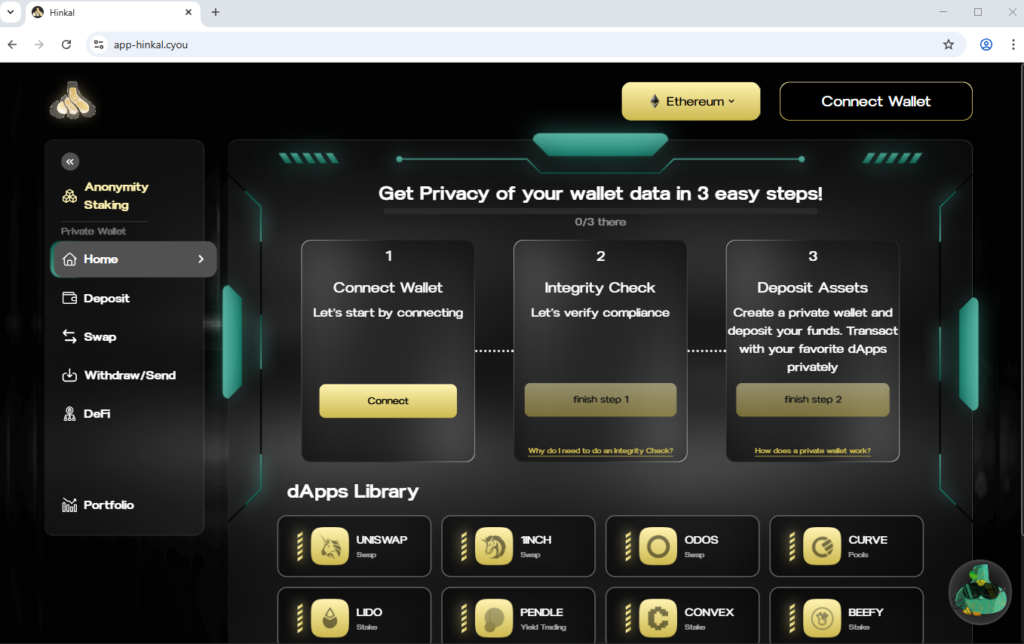Remove “Hinkal” crypto scam
The “Hinkal” crypto scam refers to scams that imitate Hinkal, a legitimate crypto platform. Malicious actors have created an imitation site app-hinkal.cyou, that asks users to connect to their digital wallets. The legitimate Hinkal website is hinkal.pro. If users connect their digital wallets on the scam site, they will initiate a crypto drainer that will make unauthorized transfers and eventually drain the wallet.
Crypto scams designed to lure unsuspecting users into triggering a crypto drainer have become quite common. We have previously written about several of these scams, such as the HEX Airdrop, SyncAppFix scam, the Onyx Goliath Staking crypto scam, and the Resolv Discord Verification scam. These scams typically follow a very similar pattern. Malicious actors carefully select a popular cryptocurrency platform to impersonate, then create scam websites that closely mimic the original. To draw users in, they launch extensive promotional campaigns across various social media platforms, using persuasive language and promising great rewards. Once users engage with these fraudulent sites, they risk unknowingly activating a crypto drainer, a malicious tool that can secretly steal all the cryptocurrencies stored in their digital wallets.
The Hinkal Protocol is a platform built to conduct user transactions privately, ensuring transaction and user confidentiality. The legitimate site for Hinkal is hinkal.pro. Malicious actors have created an imitation site on app-hinkal.cyou. While the design of the scam site closely resembles the legitimate one, the contents are different. As soon as you enter the scam app-hinkal.cyou site, you will be prompted to connect your digital wallet. Because of the nature of Hinkal, it’s not an unexpected request, but if you were to connect it on this scam site, you would activate a crypto drainer. The drainer will gradually transfer all the crypto funds in the wallet to the cybercriminals operating this “Hinkal” crypto scam. You may also not immediately notice this happening because the transactions would happen over time.
It is important to clarify that the actual Hinkal has no connection to this scam. Malicious actors are exploiting Hinkal’s rising popularity to steal users’ cryptocurrencies. The growing prevalence of these crypto scams underscores the necessity for users to be extremely vigilant and cautious when connecting their wallets and/or logging in anywhere.
Social media sites are full of links to crypto scams
Links to various scams like “Hinkal” crypto scam are very common on social media platforms, forums, and in the comments sections of crypto articles and video content. Malicious actors take advantage of various social media platforms to promote deceptive cryptocurrency scams. They are especially common on X (formerly Twitter) and YouTube.
One common tactic used by scammers is impersonating well-known figures, especially high-profile individuals like Elon Musk, whose involvement in cryptocurrency attracts considerable attention. Crypto scams are especially common on X, as the platform is very poorly moderated, allowing all kinds of crypto scams to reach a wide audience. For instance, the comments sections on Musk’s tweets have a lot of fake accounts that mimic his profile. These fake profiles often promise crypto giveaways, investment opportunities, or special crypto promotions. The fake profiles are not particularly convincing, and even a quick closer look would reveal the deception, but they are real enough to mislead less cautious or inexperienced users who do not take even the most basic precautions.
Another common platform for crypto scams is YouTube. Instead of creating new channels, scammers hijack abandoned ones, specifically those that have at least several thousand subscribers, to give the scams some credibility. They modify these channels and post misleading videos, usually showing livestreams from Tesla events, while falsely promoting rewarding crypto giveaways. These videos are designed to grab the attention of potential investors quickly, using eye-catching headlines that promise substantial returns if users were to invest. The combination of high subscriber counts and misleading content renders these scams particularly effective in attracting vulnerable, novice investors.
Site Disclaimer
WiperSoft.com is not sponsored, affiliated, linked to or owned by malware developers or distributors that are referred to in this article. The article does NOT endorse or promote malicious programs. The intention behind it is to present useful information that will help users to detect and eliminate malware from their computer by using WiperSoft and/or the manual removal guide.
The article should only be used for educational purposes. If you follow the instructions provided in the article, you agree to be bound by this disclaimer. We do not guarantee that the article will aid you in completely removing the malware from your PC. Malicious programs are constantly developing, which is why it is not always easy or possible to clean the computer by using only the manual removal guide.

